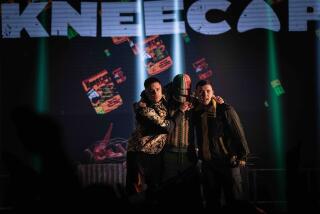Music Review : The Chieftains and Friends Pipe Up
- Share via
CERRITOS — Like Zelig, the Chieftains seem inexorably linked to the company of the famous.
*
But unlike Woody Allen’s chameleon-like hero, who had no identity of his own, the Chieftains don’t enlist the services of prominent performers out of a desperate need to fill in a blank slate. Their identity as leading exponents of traditional Irish music is unshakable, and their musical personality after 32 years as a band is strong.
Paddy Moloney, the Chieftains’ piper, tin-whistler and moving force, has charmed his band’s way into many a high-profile collaboration over the years, but the stars tend to meet the Chieftains on their own distinctively Celtic turf.
As Ry Cooder, the designated famous guest companion for Wednesday night’s concert at the Cerritos Center for the Performing Arts, put it, “You do what Paddy says. That’s all there is to it. He says come down, I come down.”
Of course, hobnobbing with famous musicians has its advantages. The immediate benefit Wednesday was Cooder’s rendition of “Coast of Malabar,” a song he sings on the Chieftains’ hot-selling new album, “The Long Black Veil.” The song’s wafting Caribbean rhythms and Cooder’s folksy, wistful performance added one more dimension to an attractive, multihued evening. (Cooder’s instrumental contribution, including lead slide guitar on another “Veil” selection, “Dunmore Lassies,” was dampened somewhat by an imperfect sound mix, and when he stayed after those two pieces for some ensemble workouts at the end, he settled into the background rather than asserting himself amid the other players’ tag-team tossing about of solos.)
The rainbow of heavy coalitions the Chieftains have forged has led to the band’s first pot of certified gold: “The Long Black Veil,” with its guest turns from a solo Mick Jagger, the Rolling Stones as a band, Sting, Van Morrison, Mark Knopfler, Tom Jones, Sinead O’Connor, Marianne Faithfull and Cooder, has sold more than 500,000 copies in six weeks.
What Moloney and his five mates have gained from this spirit of cooperation they are commendably inclined to give back: At the height of their popularity, the Chieftains are showcasing a worthy young guest musician in Carlos Nunez, a 22-year-old Spanish piper who is touring with them.
If it’s possible to become a pop star playing traditional music on bagpipes and recorder, Nunez could be the man. He is handsome and performs with kinetic flair, and his playing on the four numbers he sat in for had the presence and sense of freedom and vitality that are qualities of all exceptional musicians. Nunez hails from Galicia, a region in northern Spain that has Celtic traditions, and will be featured on a planned Chieftains album of Galician music.
For most of the show, though, the Chieftains were left to their own devices and worked their usual variety of angles with customary aplomb. The hallmark of traditional Irish music is its lofty and touching lyricism, and the Chieftains covered that repeatedly--most notably in fiddler Martin Fay’s solo rendition of the sweetly melancholy “Carrickfergus” and in harpist Derek Bell’s delicate, stately solo turn.
*
It’s no accident that “Celtic” nearly rhymes with “mystic,” and the nearly two-hour performance (sandwiched around a 20-minute intermission) had its share of moments that evoked journeys into mist-shrouded realms--including Moloney’s tin-whistle showcase on music he wrote for the film “Far and Away.”
The Chieftains handled jigs with barreling gusto. (Two Irish step-dancing champions from Long Island stomped out the beats on several numbers to lend additional visual energy to a show in which the band members mainly performed sitting down.) The muffled rattle of Kevin Conneff’s bodhran (pronounced BOAR-on ), the traditional Irish hand-drum, occasionally brought a healthy touch of pagan bite to a band that primarily plays a spirited brand of chamber music.
Humor was a running current, whether taking the form of gentle, internecine ribbing, Conneff’s singing of wry lyrics or Bell’s ongoing role as the house eccentric--picture Harpo translated into a round little professorial-looking chap who toyed with a pink, stuffed bunny rabbit and mimed his band-mates’ fiddle-bowing and flute-puffing. He also willfully sidetracked the show’s hard-rollicking climax, “Drowsy Maggie,” by taking a piano solo that forsook the 18th and 19th centuries for the 20th.
Bell’s bit was a sampler of old-time, but hardly ancient, notions from the world of vaudeville theaters, silent screens and ragtime. The other Chieftains got comic mileage by feigning exasperation and impatience with Bell’s digression from the reel work at hand.
*
The program also touched on instances in which the Irish musical tradition has become part of the American musical tradition--in a run through the fiddle tune “Cotton-Eyed Joe” and in a solo-fiddle workout by Sean Keane that smelled more of bluegrass than of shamrocks. The Chieftains were willing to acknowledge that a Transatlantic influence can work the other way: The segment that ended in bluegrass began with a taste of the blues in an interpretation of “Heartbreak Hotel.”
Other than Cooder’s appearance and Conneff’s sprightly, traditional-sounding original song, “Changing Your Demeanor,” fans of “The Long Black Veil” had to settle for a not-too-satisfying medley of bits from the hit album. It included Bell jabbing out the riff to “Satisfaction” on keyboards to evoke the Rolling Stones’ contribution on “The Rocky Road to Dublin.”
By dispensing with stuffiness and narrow definitions of traditional music while performing with the skills of great traditional players, and by inviting the help of some excellent friends, the Chieftains made two hours pass in a hurry.
More to Read
The biggest entertainment stories
Get our big stories about Hollywood, film, television, music, arts, culture and more right in your inbox as soon as they publish.
You may occasionally receive promotional content from the Los Angeles Times.











